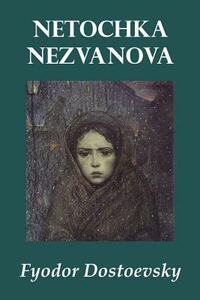Take a photo of a barcode or cover
Netochka Nezvanova is Dostoyevsky's first, though unfinished, attempt at writing a novel. He was, sadly, exiled to Siberia while working on the book, thus leaving it incomplete even after his return.
This so called prologue to the actual novel was quite disappointing. It started off strong, Efimov's story and character were intriguing and interesting, whilst the descriptions of Netochka's psychology as a kid, and ultimately as an adolescent, were in accordance with the naturalistic model of the era, realistic, vivid and memorable. I do believe that Netochka had at times an excessive behavior, which resulted in standstill, however the hints of lesbianism were refreshing.
This is definitely not a typical Dostoyevsky novel and not an indicative of his work.
This so called prologue to the actual novel was quite disappointing. It started off strong, Efimov's story and character were intriguing and interesting, whilst the descriptions of Netochka's psychology as a kid, and ultimately as an adolescent, were in accordance with the naturalistic model of the era, realistic, vivid and memorable. I do believe that Netochka had at times an excessive behavior, which resulted in standstill, however the hints of lesbianism were refreshing.
This is definitely not a typical Dostoyevsky novel and not an indicative of his work.
Dostoyevsky is always good. And this early work is impressive even in its unfinished form. But it is this, and some other deficiencies, that make this work somewhat less than his other stories.
At the final page, I wanted to keep reading, to continue the story, because already I could see how good it could be. But he can never finish it now, and that is a huge disappointment.
There are also some other narrative issues including odd starts and stops and sloppy literary transitions. It’s clear this was Dostoyevsky’s early attempt at grand story-telling....
But this is only in contrast to his later work, because even this is better than, what, maybe 95% of fiction?
Even his bad stuff is good! On his worst day he is still superior to most.
Update: Seeing reviewers here cheering Dostoyevsky's inclusion of a quasi-lesbian relationship... I've heard this before, about this book, and it's possible, I guess. But this seems to me to be 21st century readers reading a little too much into a 19th century text. The two characters involved in the relationship, remember, were only about 8 years old. From what I've seen of little kids, they do sometimes exhibit kissing phases. And they can be very affectionate. I'm not sure it's appropriate to foist our 21st century culture onto a 19th century work of Russian literature.
But this isn't to say that the relationship between Netochka and Katya seemed normal for pre-teen girls. Netochka and Katya both seemed a little too old, in terms of their thought processing and feelings (for me at least, but I guess I could be wrong). And it does seem possible that Dostoyevsky was attempting to show the affects of Netochka's familial background on her social interactions (poverty, madness, illness, deprivation, etc.).
But, then again, 8 year old girls often are expressive, and show great amounts of affection, they enjoy being together, even saying, "I love you," to each other. And etc. So I'm definitely not convinced this was Dostoyevsky portraying a lesbian relationship.
Idk, literature becomes weird when we try to put our causes onto an author's work, redefining and reanalyzing, even re-writing what a story is about. I don't think I've ever liked that whenever I've seen it done. Let the story be what it is, don't rewrite it for the author.
But I guess, this too, comes back to the fact that Dostoyevsky never finished the story, this allows readers more room to interpret; whether they're correct is another matter.
At the final page, I wanted to keep reading, to continue the story, because already I could see how good it could be. But he can never finish it now, and that is a huge disappointment.
There are also some other narrative issues including odd starts and stops and sloppy literary transitions. It’s clear this was Dostoyevsky’s early attempt at grand story-telling....
But this is only in contrast to his later work, because even this is better than, what, maybe 95% of fiction?
Even his bad stuff is good! On his worst day he is still superior to most.
Update: Seeing reviewers here cheering Dostoyevsky's inclusion of a quasi-lesbian relationship... I've heard this before, about this book, and it's possible, I guess. But this seems to me to be 21st century readers reading a little too much into a 19th century text. The two characters involved in the relationship, remember, were only about 8 years old. From what I've seen of little kids, they do sometimes exhibit kissing phases. And they can be very affectionate. I'm not sure it's appropriate to foist our 21st century culture onto a 19th century work of Russian literature.
But this isn't to say that the relationship between Netochka and Katya seemed normal for pre-teen girls. Netochka and Katya both seemed a little too old, in terms of their thought processing and feelings (for me at least, but I guess I could be wrong). And it does seem possible that Dostoyevsky was attempting to show the affects of Netochka's familial background on her social interactions (poverty, madness, illness, deprivation, etc.).
But, then again, 8 year old girls often are expressive, and show great amounts of affection, they enjoy being together, even saying, "I love you," to each other. And etc. So I'm definitely not convinced this was Dostoyevsky portraying a lesbian relationship.
Idk, literature becomes weird when we try to put our causes onto an author's work, redefining and reanalyzing, even re-writing what a story is about. I don't think I've ever liked that whenever I've seen it done. Let the story be what it is, don't rewrite it for the author.
But I guess, this too, comes back to the fact that Dostoyevsky never finished the story, this allows readers more room to interpret; whether they're correct is another matter.
Early work, interrupted by prison in Siberia.
Child’s-eye-view is hard to do well, and now I read this again, I wonder why D. decided to write as a young girl, which he never did later on (unless there is a story I haven’t read). He likes to write children later on, but these are boys – although they always have sisters. He writes women who stand for me with George Eliot’s Dorothea and Turgenev’s several women mains, as actual 19th-century-written women who were real and significant to me. Maybe, post-Siberia, he thought he’d better pull his head in and write what he knows. But this is one of the rare few books that talk to me about my childhood. Uncomfortably so, in the child’s favouritism between her parents (she took her father’s side, quite unfairly); strangely so, in his rendition of a girls’ romance. Because romances happen before sexuality or aside from it. The child’s passions for her father and then her friend were true to childhood as I knew it, if over-written by the lights of a 20th-century style. Childhood friendships, how important they were to me as a girl – more intense than adult friendships – are the part of my life I feel underrepresented in fiction, so I grabbed onto this. The child’s moral quandaries seem unusual in fiction too – I thought of Little Dorrit, this time around, but am tempted to maintain Netochka is given more moral agency, at a very young age. I think this is right; at least, the novel mattered to me for it.
I haven’t talked about Efimov, the frustrated musician with a self-defeating personality; but then others do. He was striking, and has an afterlife in later work – not the musicianship so much, and I enjoyed D. hanging out with artists; I can wish he had done more of that too.
From Joseph Frank, [b:Dostoevsky: The Seeds of Revolt, 1821-1849|434860|Dostoevsky The Seeds of Revolt, 1821-1849|Joseph Frank|https://d.gr-assets.com/books/1348019431s/434860.jpg|423793], I learn: most speculate that Netochka was to become a great singer (not the sort of plot D. ever did later); he was heavily influenced by George Sand at the time. Frank has a good few pages on Netochka, context and what his aims might have been; anyway, this to me, pre-Siberia, was the most interesting volume of Frank’s five, told me most about him.
Child’s-eye-view is hard to do well, and now I read this again, I wonder why D. decided to write as a young girl, which he never did later on (unless there is a story I haven’t read). He likes to write children later on, but these are boys – although they always have sisters. He writes women who stand for me with George Eliot’s Dorothea and Turgenev’s several women mains, as actual 19th-century-written women who were real and significant to me. Maybe, post-Siberia, he thought he’d better pull his head in and write what he knows. But this is one of the rare few books that talk to me about my childhood. Uncomfortably so, in the child’s favouritism between her parents (she took her father’s side, quite unfairly); strangely so, in his rendition of a girls’ romance. Because romances happen before sexuality or aside from it. The child’s passions for her father and then her friend were true to childhood as I knew it, if over-written by the lights of a 20th-century style. Childhood friendships, how important they were to me as a girl – more intense than adult friendships – are the part of my life I feel underrepresented in fiction, so I grabbed onto this. The child’s moral quandaries seem unusual in fiction too – I thought of Little Dorrit, this time around, but am tempted to maintain Netochka is given more moral agency, at a very young age. I think this is right; at least, the novel mattered to me for it.
I haven’t talked about Efimov, the frustrated musician with a self-defeating personality; but then others do. He was striking, and has an afterlife in later work – not the musicianship so much, and I enjoyed D. hanging out with artists; I can wish he had done more of that too.
From Joseph Frank, [b:Dostoevsky: The Seeds of Revolt, 1821-1849|434860|Dostoevsky The Seeds of Revolt, 1821-1849|Joseph Frank|https://d.gr-assets.com/books/1348019431s/434860.jpg|423793], I learn: most speculate that Netochka was to become a great singer (not the sort of plot D. ever did later); he was heavily influenced by George Sand at the time. Frank has a good few pages on Netochka, context and what his aims might have been; anyway, this to me, pre-Siberia, was the most interesting volume of Frank’s five, told me most about him.



